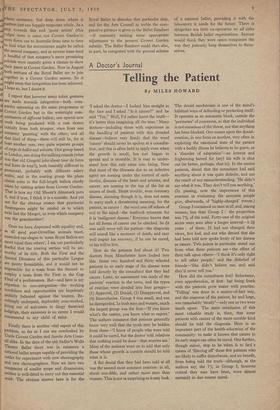A Doctor's Journal
Telling the Patient
By MILES HOWARD
'I asked the doctor—I looked him straight in the face and I asked "Is it cancer?" and he said "Yes." Well, I'd rather know the truth— it's better than imagining all the time.' Many doctors—including those with experience in the handling of patients with this dreaded disease—believe very firmly that the word 'cancer' should never be spoken at a consulta- tion, and this is often held to apply even when the growth is small, has not begun to spread and is treatable. It is easy to under- stand how this rule came into being. Now that most of the illnesses due to an infective agent are coming under the control of anti- biotics, diseases of the heart and arteries, and cancer, are coming to the top of the list as causes of death. Heart trouble, even coronary disease, alarming though it is, does not seem to carry such a threatening meaning, for the patient, as cancer : the word sets off echoes of evil in the mind—the textbook synonym for it is 'malignant disease.' Everyone knows that not all forms of cancer can be checked. So (it was said) never tell the patient—the diagnosis will sound like a sentence of death, and may well impair his recovery, if he can be cured, or his will to live.
How do the patients feel about it? Two doctors from Manchester have looked into this. Some two hundred and thirty selected patients in an early stage of the disease were told directly by the consultant that they had cancer. Later, an assessment was made of the patients' reaction to the news, and the types of reaction were divided into four groups— (1) Approval, (2) Denial, (3) Disapproval, and (4) Inconclusive. Group 4 was small, and can be disregarded. In both men and women, much the largest group was the first—'If you know what's the matter, you know what to expect.' The authors comment that patients generally know very well that the truth may be hidden from them—'I know of people who were told it could be cured, but the doctor told relatives that nothing could be done—that worries me.' Most of the patients went on to add that only those whose growth is curable should be told what it is.
A flat denial that they had been told at all was the second most common reaction: in all, about one-fifth, and rather more men than women. This is not as surprising as it may look. The denial mechanism is one of the mind's habitual ways of defending or protecting itself: It operates as an automatic block, outside the 'perimeter' of awareness, so that the individual is not conscious of the threat, nor that anything has been blocked. One comes upon the denial- reaction, in one form or another, very often in exploring the emotional state of the patient with a bodily illness he believes to be grave, or a 'disorder of adaptation'—an intense and frightening hatred for (say) his wife is shut out (or better, perhaps, shut in). In the cancer patients, denial that the consultant had said anything about it was quite definite, and not the result of any misunderstanding. 'He didn't say what it was. They don't tell you anything.' (In passing, note the importance of this reaction in evaluating the accounts people give, afterwards, of 'highly-charged' events.) Group 3 contained no men at all, and, among women, less than Group 2 : the proportion was 7% of-the total. Forty-one of the original series were seen after a longer interval-1-21 years ; of these, 35 had not changed their views, five had, and one who denied that she had been told now spoke freely of her disease as cancer. Tvio points in particular stand out from what these patients say—the effect of their talk upon others—'I think it's only right to tell other people,' and the disbelief of friends—'She didn't believe me, and said they'd never tell you.'
How did the consultants feel? Reluctance, even apprehension, at first: but being, frank with the patients grew easier with practice. 'Telling' was done in a matter-of-fact way, and the response of the patient, by and large, was remarkably 'steady'—only one or two were much upset. The main conclusion of this most valuable study is, then, that some patients with cancer of the more curable kind should be told the diagnosis. Here is an important part of the health-education of the community: to make it known that cancer in its early stages can often be cured. One further, though minor, step to be taken is to find a means of 'filtering off' those few patients who are likely to suffer disturbance, and no benefit, from being told the truth—although, as the authors say, the 7% in Group 3, however critical they may have been, were almost certainly in due course cured.






























 Previous page
Previous page